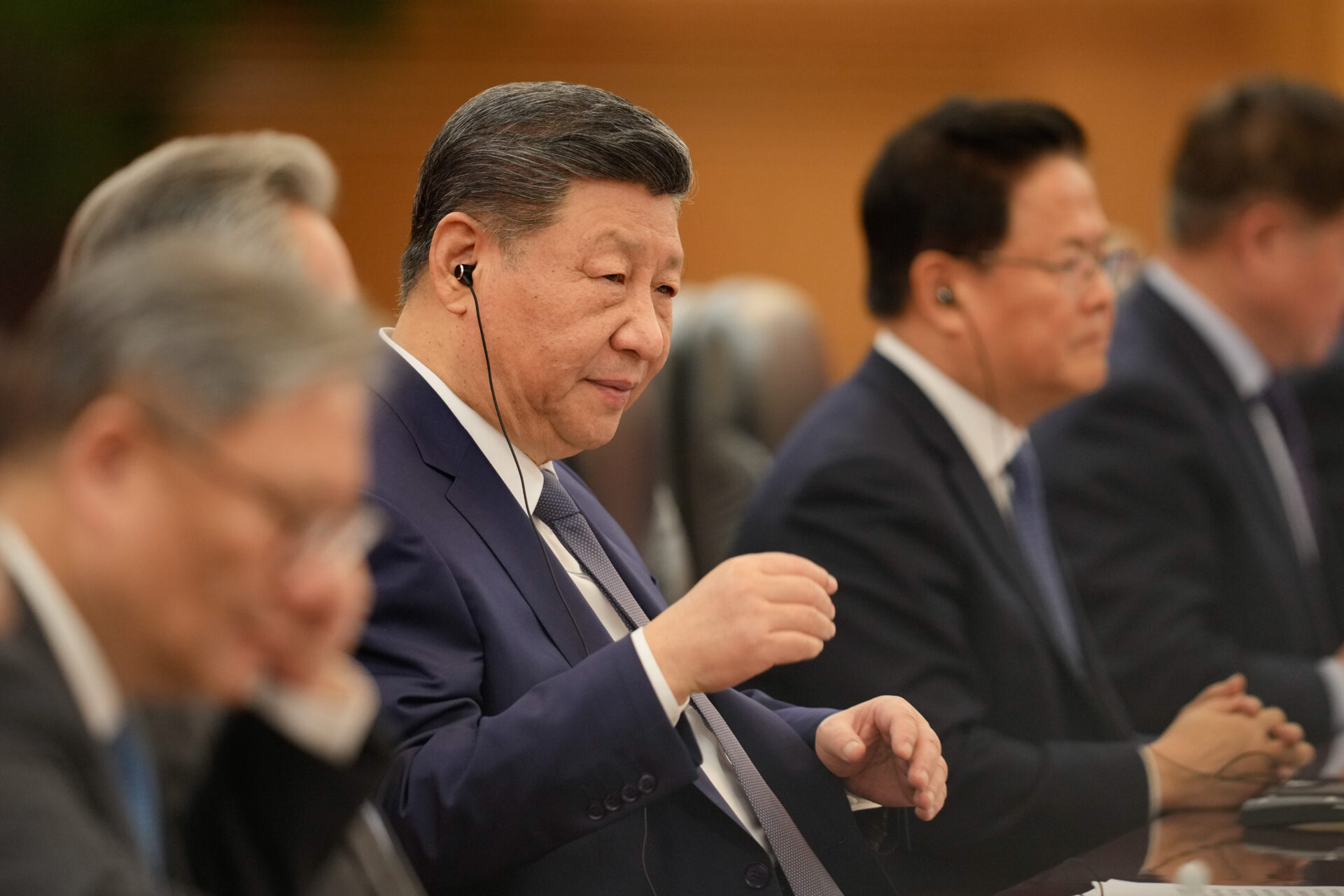
Diplomacy with Chinese Characteristics: PRC Consulate Gray Zone ‘Pop-up’ Events in New York and Beyond
Diplomacy with Chinese Characteristics: PRC Consulate Gray Zone ‘Pop-up’ Events in New York and Beyond
Executive Summary
- The Consulates General of the People’s Republic of China (PRC) in New York, San Francisco, and Chicago have been conducting gray zone “pop-up” consular service events across the United States under the initiative “Bringing Consular Services into the Community,” often at non-diplomatic facilities. These events provide consular services such as passport renewals and document processing, but their legality remains questionable due to possible violations of international law.
- These events likely serve as platforms for the PRC’s broader political influence operations, potentially gathering intelligence on Chinese diaspora communities and mobilizing them for future operations, including political activities. The events have been co-hosted by community organizations with links to the CCP’s united front system, raising concerns about data handling and surveillance.
- The events may also align with the PRC’s broader strategy of influence and electoral interference in the United States, targeting districts with substantial Chinese American populations and potentially mobilizing community support for specific candidates and political agendas.
- Online propaganda campaigns, coordinated across Chinese and Western social media platforms, accompany the events as part of a gray zone approach to cognitive warfare.
Editor’s Note: This piece is a combined version of Part I & Part II, which appeared in China Brief, Volume 24, Issues 19 & 20, respectively. You can also read this combined version in PDF format by scrolling to the bottom of this page.
Consulates General of the People’s Republic of China (PRC) in New York, San Franciso, and Chicago have been organizing a series of gray zone events providing consular services in the form of “pop-ups” at non-designated diplomatic facilities across the United States. [1] Under an initiative referred to as “Bringing Consular Services into the Community (领事服务进社区),” these events typically last anywhere from a few hours to a full day and offer services such as passport renewal and the issuing of travel documents to PRC citizens. Over 90 have been hosted across the country, with more than 80 organized by the New York consulate, which has run events in 15 cities across 7 states since 2016. The venues for these events are wide-ranging. Some have taken place in clubhouses, university classrooms, and elderly centers, while others have been hosted in the offices of community associations, shopping malls, and restaurants. [2]
The legality of the pop-ups is unclear. Since the venues for these events are not located at designated facilities that enjoy extraterritorial protections for providing consular services, the PRC would likely require the consent of the US Government to conduct them. If they were not accredited by the host country, Beijing is likely violating international law. [3] Even if these events have been authorized by the US Government, the evidence suggests that they have exceeded the remit of providing consular services by also providing platforms for political activities. It is also possible that these events have enabled the PRC to conduct influence operations (IOs) and lay the groundwork for electoral influence and other activities while strengthening their capacity for overseas political mobilization.
Figure 1: The distribution map of the locations of pop-up events from 2016 to 2024. This map only includes events organized by the PRC Consulate General in New York.
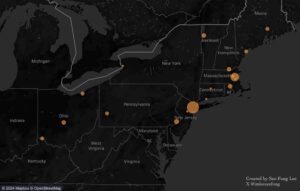
(Source: Author)
The US government has announced that it is aware of PRC activities that are seeking to influence congressional races and candidates in the country’s November elections (US Department of State, October 7). It has not stated whether it is aware of the penetration of Chinese Communist Party (CCP) officials directly into local communities via consular “pop-up” events. These events are often co-hosted with organizations connected to the CCP’s united front system, some of which appear to have been involved in influencing previous election races (US China Press, July 31, 2023).
These apparently innocuous events can be seen as part of a broader strategy by the PRC that uses gray zone tactics to disrupt existing diplomatic and legal practices and create new norms. The increase in frequency of events under this consular initiative indicates a gradual institutionalization and intensification of the PRC’s preexisting extraterritorial law enforcement efforts. Like other gray zone operations conducted by the PRC, these consular services events challenge the international rules-based order but do so under the threshold that would provoke major diplomatic retaliation. This is crucial to the PRC’s hybrid warfare strategies.
Eight Years of Community Penetration
In the United States, there are five recognized traditional PRC foreign missions. These are the PRC Embassy, located in Washington, DC, and four recognized consulates in New York, Chicago, San Francisco, and Los Angeles (US Department of State, May 21, 2021). Over the last eight years, the PRC’s consulates have made efforts to engage with local Chinese diaspora communities under an initiative called “Bringing Consular Services into the Community (领事服务进社区).”
The New York Consulate General has apparently been a pioneer of these pop-up events. In 2024 alone, it has hosted at least 27 events in various parts of New York City, Boston (Massachusetts), Philadelphia and Pittsburgh (Pennsylvania), Cleveland and Cincinnati (Ohio), Pawtucket (Rhode Island), and Metuchen and Cedar Knolls (New Jersey) (see Appendix, Table 1). The events themselves have taken place in venues that range from clubhouses, university classrooms, and elderly centers, to associations’ offices, shopping malls, and restaurants. The first pop-up event in 2024 took place at an adult day care center in Flushing, New York, on March 12. At the session, PRC Consul General Huang Ping (黄屏), and his deputy Wu Xiaoming (吴晓明), personally processed passport applications, renewals, and “overseas residents pension qualification verifications” for overseas Chinese (PRC Consulate General in New York; March 6, March 12). From April 15–20, 2024, Deputy Consul General Wu Xiaoming (吴晓明) also led a working group from the New York consulate that hosted four sessions providing consular services for PRC nationals. These took place in New York, Ohio (2 days), and Pennsylvania. The events took place in a University classroom, the Union Center Pavilion, a retirement home, and a Chinese restaurant, respectively (PRC Consulate General in New York, April 9).
The initiative “Bringing Consular Services into the Community” under which these events have taken place appears to date back as early as January 2016. The official name of the first documented “consular service” event was “Bringing Services to the Overseas Chinese Association (送服务进侨团).” During that event, former PRC Consul General in New York Zhang Qiyue (章启月) led a team in Brooklyn providing on-site services for overseas Chinese. These included pension audit verification applications, and both consultations on and applications for passports and visas (WeChat/PRC Consulate General in New York, January 25, 2016). In February 2017, the New York consulate launched “consular services month.” Spanning February 7–April 8, this involved a series of 30 “Bringing Consular Services into the Community” events organized with the help of 19 “overseas Chinese cooperation associations (合作侨团)” and over 300 “volunteers (志愿者)” (WeChat/PRC Consulate General in New York, April 21, 2017).
Figure 2: Deputy Consulate General Wu Xiaoming at a consular service pop-up event in a classroom in Capen Hall at the State University of New York at Buffalo on April 20
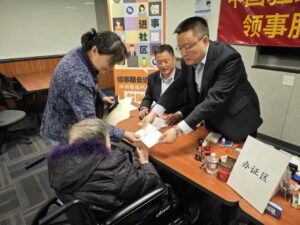
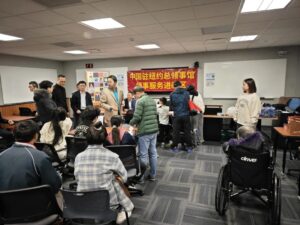
(Source: PRC Consulate General in New York, April 22)
The success of these early events has led the consulate to host pop-up events with more regularity. As it has done so, the scope of the services provided has expanded. Now, beyond services catering to retired PRC citizens such as the “overseas residents pension qualification verification” application, more formal consular services such as passport renewal and the issuing of travel documents are also offered to PRC nationals more generally. The services have also expanded in scale, taking place across a number of different states within the New York consulate’s consular district (PRC Embassy to the United States, June 29).
Pop-Ups Align with Party Policies
The motivations for the initiative can be traced back to Party documents and high-level speeches. This includes directives found in the work reports CCP Chairman Xi Jinping delivered to the 19th and 20th Party Congresses that have sought to enhance the well-being of and strengthen ties with overseas Chinese communities (Xinhua, October 27, 2017; Gov.cn, October 25, 2022). The initiative is also a manifestation of the concept of “people-centered diplomacy (外交为民)” (PRC Consulate-General in Chicago, March 3, 2017; Xinhua, December 9, 2023). As articulated by Xi, people-centered diplomacy entails “actively expanding the work of overseas Chinese affairs,” “safeguarding the security, legitimate rights, and interests of overseas Chinese,” and making Chinese citizens “feel the strength and the warmth of their motherland, as well the dignity and honor of being Chinese (让中国公民在世界各地都能感受到祖国的力量与温暖,感受到中国人的尊严与荣耀)” no matter where they are (People’s Daily, December 30, 2023; China’s Diplomacy in the New Era, accessed July 9).
In addition to PRC consulates, the main bodies tasked with executing the initiative are associations and “volunteers” affiliated with the United Front Work Department (UFWD) and the All-China Federation of Returned Overseas Chinese (ACFROC)—organizations that are central to CCP strategies targeting the Chinese diaspora. [4] According to Party literature, united front strategies include “using the legal to mask the illegal (利用合法掩护非法,合法与非法巧妙结合)” and other principles such as building networks for “nestling intelligence within the united front (寓情报于统战中)” and “using the united front to drive intelligence (以统战带动情报)” (People’s Daily, November 18, 2020).
It follows from this that PRC officials and affiliated organizations may be using the pop-up events for more than their explicit function of providing consular services. Namely, the events could serve as cover for expanded influence operations (IOs) within Chinese American communities. For the PRC, pop-ups offer several benefits. By actively going into local communities, the consulates can extend their reach far beyond what they would by only providing services within their designated consular offices. This is especially the case for people who might hesitate to visit a consulate due to the prospect of long-distance travel or the non-urgent status of renewing documentation (if, for instance, that person has no plans to travel overseas). The pop-ups also seem to fly under the radar of local law enforcement, which allows them to operate with relative freedom. They are cost-effective, too, as they leverage the capacity of the consulates’ cohosts, which are usually CCP-affiliated organizations. Cohosting with community organizations also provides the PRC with direct access into the communities themselves.
There are several ways in which these pop-ups might provide opportunities for gathering intelligence on diaspora communities in the United States. An explicit feature of the events is to process documents and applications for documents for PRC citizens. The extensive reach into local communities that they provide enables the PRC government to gather personal data and information on overseas citizens much more effectively than they do with other events, such as gatherings or rallies organized by overseas Chinese cooperation associations or cultural and business organizations. Personal information might include people’s immigration status—for instance, what visa they might be on, whether they are permanent residents, or if they are American citizens. This information would be useful to the PRC, as it can be used, among other things, to identify citizens for possible future operations such as election interference activities.
In addition, cohosting events with community organizations raises the possibility of mishandling private information. At the consular services events, members of associations act as “volunteers” whose responsibilities include “helping to fill out forms” that include applicants’ personal information. In some instances, applicants are required to pick up their approved or completed forms at these associations’ addresses at a later date (WeChat/PRC Consulate General in New York, March 15, 2019). This unusual approach to the handling of personal data opens the door to intelligence gathering and the surveillance of former PRC residents. This could advance Beijing’s broader transnational repression and repatriation campaigns, as has been noted in the case of the PRC’s overseas police stations (Canada National Security and Intelligence Committee of Parliamentarians, June 3).
Figure 3: A consular service pop-up event at a Chinese restaurant in New York on Feb 23, 2017
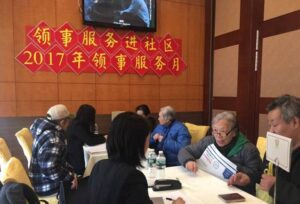
(Source: PRC Consulate General in New York, February 24, 2017)
Figure 4: A consular service pop-up event at a shopping mall in Ohio on March 15, 2017
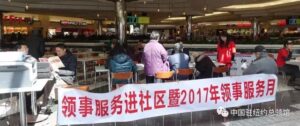
(Source: PRC Consulate General in New York, March 20, 2017)
The pop-ups could also provide an avenue for the PRC to shape the domestic politics of the United States in ways that align with its own interests. Cross-referencing the precise addresses of nearly all of the pop-ups with electoral district maps indicates two things. First, pop-ups tend to occur in constituencies that are home to substantial Chinese American populations. Second, they tend to occur in separate constituencies. For instance, of the 11 sessions hosted in New York State between March and July 2024, most were hosted in distinct congressional, senate, and assembly districts. The only exception was the city’s Chinatown, a constituency with a large Chinese American population, where three of the events were hosted. This suggests that the pop-ups could provide a basis for mobilizing people to support specific candidates running for seats at various levels of government (See Appendix, Table 2).
Pop-up Cohosts’ Links to the Party-State
The consulates general usually cohost pop-up events alongside local community organizations. The Fujian Association In USA (美国福建会馆), for instance, often provides support for the New York consulate’s events. According to an announcement by the consulate, an event on May 9 was hosted at the association’s address, though the name of the association itself was not included (PRC Consulate General in New York, May 1). [3] The involvement of this association’s members can be confirmed, however, by identifying them in photos from the event (World Journal, May 14; The USA Hall of Fame, May 14).
Many of these organizations already have links to the united front system. The Fujian Association In USA allegedly has ties with the Fujian Province Federation of Returned Overseas Chinese (福建省归国华侨联合会), a provincial-level branch of ACFROC. The association’s president, Chen Zhao-yin (陈昭银), led a delegation to visit municipal-level ACFROC in Fuzhou in April 2023 where they met with Lin Gaoxing (林高星), a PRC official who is also the chairman of the Fuzhou Federation of Returned Overseas Chinese (Chinaqw, April 20, 2023). [5]
Organizations that have participated in the pop-ups have also engaged in election-related activities in the United States. For example, on March 22, 2023, the New York-based American Association of Cantonese (纽约广府人总会) co-hosted a session endorsing Susan Zhuang (庄文怡), a city council candidate for Brooklyn’s 43rd District. At the event—one of two held in early 2023 for this purpose—the organizers claimed that they would be “sending a team of volunteers to help her win the final victory (将派出义工团助选她赢得 … 最终胜利)” in the election (US China Press, July 31, 2023). The association, as well as its president Luo Shaoling (罗少领), appears to have a close relationship with entities affiliated with the PRC Party-state. In November 2023, the group led a delegation to meet with Li Feng (李丰), the chairman and Party secretary of the Guangdong Federation of Returned Overseas Chinese, a CCP organization that is part of the united front system (Guangdong Province Federation of Returned Overseas Chinese, November 23, 2023).
These organizations have also engaged in other activities that align with the interests of the CCP and the objectives of the united front. In August 2023, for instance, the Fujian Association In USA organized a protest against the visit of the then-Vice President of Taiwan Lai Ching-te (賴清德) to New York (US China Press, August 14, 2023).
Figure 5: Consular service pop-up event at the Fujian Association in USA in New York on May 9

(Source: The USA Hall of Fame, May 14)
Other organizations that participate in the pop-ups are affiliated with Beijing’s Ministry of Public Security (MPS). For example, the US Department of Justice (DOJ) in April 2023 charged two men with “conspiring to act as agents of the PRC government as well as obstructing justice by destroying evidence of their communications with an MPS official” (US Department of Justice, April 17, 2023). One of the men, Lu Jianwang (卢建旺), is co-president of the Fukien Benevolent Association of America (福建同乡会). According to the DOJ’s press release, Lu was acting under the direction and control of the MPS official and helped open and operate the first known overseas police station in the United States on behalf of the Fuzhou branch of the MPS. On March 12, 2024, long after the charges were made, the Fukien Benevolent Association of America participated in a “Bringing Consular Services into the Community” event organized by the New York consulate.
Figure 6: The Fujian Association in USA (美国福建会馆) participates in a counterprotest against the visit of the then-Vice President of Taiwan Lai Ching-Te to New York on August 13, 2023
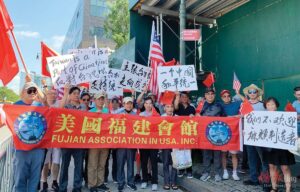
(Source: US China Press, August 14, 2023)
Online Influence Operations Reinforce Consular Events and Xi Jinping’s Ideological Campaign
Much of the activity surrounding these consular events occurs in the digital domain. Increased activity is found before and after pop-up events, usually coordinated across Chinese and Western social media platforms and between official accounts and those of state-affiliated media. Online content serves two purposes. One is informational, to broadcast general information about the events themselves for potential attendees and to document their execution. The other is to propagandize on behalf of the Party-state. Two narrative frames recur throughout the content posted about the pop-up events: The characterization of the consular officials—and, by extension, the CCP—as benevolent and willing to go above and beyond for its citizens, and of those citizens as grateful, in turn, to the “motherland” for taking care of their needs.
Consular service activities organized by the PRC’s consulates general in the United States often coincide with broader propaganda work, both on-site at the events and through social media campaigns from the consulates themselves. The PRC consulate general in New York, for instance, publishes regularly on its WeChat account both before and after the events that it runs. For instance, in March 2024, at the first consular service event of the year, Consul General Huang Ping delivered a speech highlighting the consulate’s efforts in organizing the event series. He stated that the events exemplify Beijing’s commitment to “serving the people” and that he and the New York consulate will always strive to enhance the “sense of accomplishment and happiness” of overseas Chinese people (WeChat/PRC Consulate General in New York, March 12). Rhetoric of this nature has long been used by PRC diplomats overseas. New York’s previous consul general Zhang Qiyue also made a speech elaborating on the CCP’s 19th National Congress in October 2017—stressing the consulate’s commitment to people-centered diplomacy and to improving consular services for overseas Chinese people (WeChat/PRC Ministry of Foreign Affairs, November 10, 2017). Through direct engagement from consuls general, pop-up consular service events are intended to project a positive image of the PRC and convince Chinese Americans that they are closer to Beijing than Washington.
Chinese social media platforms such as WeChat and Weibo disseminate information that supports, and at times enhances, the rhetoric of the consuls general, using language that frames the PRC as providing “caring” services that seek to be “convenient” for their target audience. Such messaging aims to increase the sense of belonging among overseas Chinese and to instill in them a sense of patriotism, or even nationalism. Xi Jinping has repeatedly emphasized that united front work focuses on uniting all who can be united by strengthening common ideologies, with the goal of developing the “broadest patriotic united front to accomplish the China dream (最广泛的爱国统一战线为实现中国梦)” (People’s Daily, May 20, 2015). [6] Through their outreach into local diasporic communities, the PRC consulates general conduct political work, promoting Xi Jinping’s language about “national rejuvenation” to influence perceptions of the PRC and strengthening their presence within the Chinese diasporic communities in America.
An article published by the official WeChat account of the PRC consulate general in San Francisco used glowing terms to portray a trip to Seattle to host a “Bringing Consular Services into the Community (领事服务进社区)” event over a weekend in October, 2023 (WeChat/PRC Consulate General in San Francisco, October 17, 2023). [7] After detailing the consular services provided, the article valorized the consular officials and depicted the attending local Chinese community, who ranged from 95-year-old pensioners to one-month-old babies, as full of admiration for their work. It claimed the Chinese community was “grateful (感谢)” for the consulate’s efforts to “send staff from afar and use their weekend to provide consular service (派工作人员远道而来,利用周末期间为侨胞办证),” while emphasizing how “convenient (便捷)” the consulate staff made the process and how “warm and considerate (热情周到)” they were. The article finished by describing how the residents sincerely felt the “love and care (关心关爱)” of their “motherland (country of citizenship) (祖(籍)国).”
Figure 7: Screenshot of the WeChat article published by the Chinese Consulate General in San Francisco, titled “Consulate General in San Francisco hosts ‘Bringing Consular Services to the Community’ Event in Seattle”
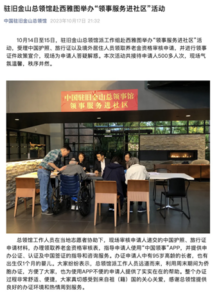
Online Networks Coordinate to Amplify Propaganda
Articles such as those highlighted above are effectively propaganda pieces about consular pop-up events. Not only are they frequently posted by the PRC consulates’ WeChat accounts, but they are also cross-posted to other social media platforms, including Western platforms such as Facebook and YouTube, which are popular among some diasporic communities. Entities involved in amplifying these influence operations range from Chinese state media’s official accounts and gray media to organizations with alleged ties to PRC state entities.
The Pittsburgh Chinese Cultural Center, for instance, shared the details of an upcoming consular service event on Facebook, X (formerly Twitter), and Linkedln on April 9, 2024 (Facebook.com/pghccc, X.com/Pghccc; linkedin.com/pgh-chinese-cultural-center, April 9). The close time intervals between this post and the official launch post by the consulate general suggest potential coordination between the two organizations (PRC Consulate General in New York, April 9). This possibility is made more likely by the fact that the chairman of the Pittsburgh Chinese Cultural Center, Dave Jiao (焦德泉), appears to have a close relationship with the New York consulate. During the COVID-19 pandemic, Mr. Jiao’s contact details were shared by the consulate for “assisting overseas Chinese students” (Pittsburgh Chinese Cultural Center, accessed September 14; WeChat/PRC Consulate General in New York, April 1, 2020).
Coordination of this kind is made even more likely when considering the broader pattern of cross-posting—a common tactic in online influence operations that seeks maximum exposure of specific content to a target audience. In these cases, content published by the consulates’ official channels is cross-posted to other platforms, including Western ones such as Facebook and YouTube. Cross-posted content is not confined to the consulates’ official accounts: it also occurs via other entities. One such example is the social media presence of China DragonTV (东方卫视), an entity under the direct control of the state-owned Shanghai Media Group (上海广播电视台) (SMG, accessed July 19).
Figure 8: LinkedIn (right) and Facebook (left) Posts by the Pittsburgh Chinese Cultural Center
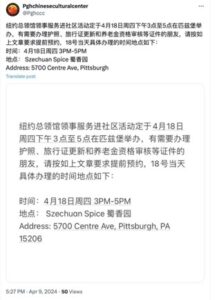
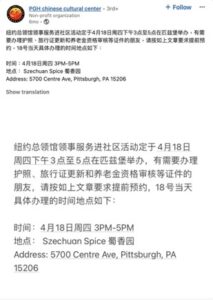
On December 12, 2023, China DragonTV published a video titled “The Chinese Consulate General in New York’s ‘Bringing Consular Services to the Community’ event has provided services to over 2,000 overseas Chinese this year, and the expatriates have praised it warmly!” on both its Douyin account and its YouTube channel (Douyin/China DragonTV; YouTube/China DragonTV, December 12, 2023). The video highlights an event held the previous week in Ohio and includes an interview with New York Consul General Huang Ping claiming that this form of people-centered diplomacy is very welcome, making the Chinese community “truly feel” that “the motherland is right behind them and the consulate general is right beside them (祖国在你身后,总领馆在你身边).” Soundbites from visitors featured in the clip praise the convenience of the consular service, making them feel like “every Chinese person is being treated as a family member (把每个人 (侨胞) 都当成自己家人).” These edited interviews are presented as vox pops that are representative of the diasporic community more broadly, helping to advance the narrative that overseas Chinese people are grateful to their benevolent motherland.
Figure 9: Screenshot of a video published by China Dragon TV on its YouTube Channel (left) and Douyin account (right)


PRC state media outlets also move beyond simple cross-posting to provide supplemental coverage of the consular events, representing an additional avenue for advancing PRC narratives in the United States. US China Press (侨报网) is one such outlet. Founded by personnel from PRC state media China News Service and the Overseas Chinese Office of the State Council in the early 1990s, it was originally conceived as an effort to crack down on negative public opinion on Beijing after the Tiananmen Square massacre. [8] It is currently managed by The China Press/Qiaobao (侨报), a news outlet controlled by the United Front Word Department through PRC state media China News Service. [9] This affiliation is omitted on its social media profiles, however. On TikTok, for instance, the US China Press describes itself as founded by 11 Chinese Americans who immigrated from Mainland China, Taiwan, and Hong Kong (US China Press, accessed September 19). The outlet has written extensively on the pop-up events, publishing 26 articles between January 2019 and July 2024 highlighting these gray zone activities. The articles actively promote the consular services by emphasizing the “friendly interaction (亲切交流)” between consular officers and participants, the “warm atmosphere (温暖的气氛)” of the events, and the positive feedback received from the Chinese diasporic communities (US China Press; March 27, July 15). This messaging echoes the descriptions seen in the consulates’ official characterizations of the pop-up events, further suggesting a degree of coordination.
In addition, the consulates’ apparent ability to coordinate between purportedly independent organizations and media outlets to amplify specific information and propaganda narratives is an alarming sign of the PRC’s growing efforts to interfere in—and gain more control over—Chinese diasporic communities through their digital information environment.
Politicization of ‘Pop-ups’ as Peacetime Cognitive Domain Operations
Posts on social media platforms about the events generally have low viewership and engagement rates, though this does not necessarily equate to impact. While these operations appear to primarily target overseas Chinese people and hence may have limited reach among non-Chinese language speakers, their implications on threatening national security and liberal democracy are far more profound beneath the surface.
Constant messaging of this kind represents one tactic among a broader ideological campaign that intrudes not only on foreign territories but also on diasporic communities’ cognitive sovereignty. Consistently framing the PRC as a benevolent state that is looking out for its compatriots overseas is a tactic within the PRC’s approach to peacetime cognitive warfare (China Brief, September 6, 2019). While nominally used to provide consular services to local communities in the United States, the PRC intentionally politicizes these bureaucratic processes through calculated moves to shape diasporic perceptions. This approach operates in the gray zone, allowing nominally bureaucratic activities to serve as a medium for influence operations that reinforce the CCP’s preferred narrative about the PRC. Part of the goal of this ideological push is to inculcate a sense of loyalty to the nation, with the implicit assumption that the state’s benevolence will one day need to be repaid through political mobilization.
As such, consular pop-up events should be viewed as part of the PRC’s wider use of hybrid tactics that erode the legal norms and institutions established by its adversaries. The regular operationalization of the initiative, in fact, represents an intensification of the PRC’s preexisting extraterritorial law enforcement efforts. Without effective countermeasures, this is likely to continue and expand.
Conclusion
The PRC’s consulates general in the United States have, for at least eight years, run pop-up events across the country that appear to contravene either international law, US domestic law, or both. It is unclear whether the consulates have received approval from the US Department of State to run these events. Even if they have done so, any authorization would strictly be limited to the provision of consular services. It appears, however, that the pop-up events, which tend to be co-hosted with organizations with links to the CCP and its united front system, have also served political purposes.
These “Bringing Consular Service into Community” pop-up events are likely a worldwide operation. Similar events appear to have been conducted by local PRC consulates under the same initiative in Canada, the United Kingdom, Hungary, Tanzania, Jamaica, and elsewhere. None of these seem to be on the same scale as in the United States, however. While consulates’ gray zone activities in different countries may differ, they all carry similar implications that constitute a far more problematic issue than their nominal function of providing innocuous “consular services.”
These gray zone operations set a precedent for the PRC’s growing, pervasive efforts to extend its outreach and exert control over the Chinese diaspora in external jurisdictions. Reinforced by Beijing’s influence operations on social media, the pop-ups serve as a basis for broader ideological campaigns. The aim, as articulated by Xi Jinping, is not only to influence public perceptions of the PRC but also to generate a “patriotic united front” for his dream of “national rejuvenation.” Through these pop-up events, PRC diplomats are leveraging an asymmetric advantage, exploiting open societies and vulnerabilities inherent in liberal democratic systems. Such tactics lie at the heart of the PRC’s hybrid warfare strategy. Beijing’s gray zone operations challenge existing international norms and rules-based order, yet under the threshold of a major diplomatic scandal.
Irregular activities of this nature may serve as peacetime united front operations to advance overseas political mobilization capabilities. While the effectiveness of the events as opportunities for intelligence gathering is unclear, these pop-up events enable the PRC to strengthen ties with overseas Chinese communities. In doing so, they can explore approaches to better coordinate and mobilize for future operations—including kinetic operations—all in the name of “diplomacy for the people.”
Notes
[1] A note on methodology. This report leverages Open-Source Intelligence techniques (OSINT), examining publicly available data from websites and social media platforms collected between January 1, 2016, and September 7, 2024. A combination of social media monitoring and off-the-shelf tools were used to collect publicly available data for the case studies. This timeframe was selected to capture the most relevant case studies since the launch of the initiative. Analysis of the collected data identifies strategies deployed, trends and patterns, and attributions of the influence operations.
[2] The full list of events organized by the PRC Consulates General in New York, San Francisco, Chicago, and more from 2016 to 2024 may be shared upon request to the author.
[3] The Vienna Convention on Consular Relations states that “the prior express consent of the receiving State shall also be required for the opening of an office forming part of an existing consular post elsewhere than at the seat thereof” (International Law Commission, 2005).
[4] ACFROC is the principal united front organization that is tasked with influencing ethnic Chinese overseas. See Joske, Alex. (2020). “The party speaks for you: Foreign interference and the Chinese Communist Party’s united front system.” Australian Strategic Policy Institute. Available at: https://www.aspi.org.au/report/party-speaks-you.
[5] Lin appears to be also the former Deputy Director of the Fuzhou Municipal Bureau of the Ministry of Industry and Information Technology (福州市工业和信息化局副局长) and Deputy County Mayor of the Luoyuan County People’s Government (罗源县人民政府副县长). PRC official sources do not provide photos of him, so we have not been able to confirm that this is the same person (Fuzhou Government, July 24, 2014; September 3, 2021).
[6] On the “China dream,” see China Brief, March 28, 2013; April 25, 2013.
[7] In addition to the PRC consulate in New York, the PRC consulates general in San Francisco, Chicago, and Houston all appear to organize similar events under the same “Bringing Consular Services into the Community” initiative. The time frame for these events ranges from 2017 to 2024.
[8] Diamond, Larry and Schell, Orville. (2019). “China’s Influence & American Interests: Promoting Constructive Vigilance.” The Hoover Institution Press. Available at: https://www.hoover.org/research/chinas-influence-american-interests-promoting-constructive-vigilance
[9] Joske, Alex. (2020). “The party speaks for you: Foreign interference and the Chinese Communist Party’s united front system.” Australian Strategic Policy Institute. Available at: https://www.aspi.org.au/report/party-speaks-you.
Appendix
Table 1: List of Venues for Events organized by the PRC Consulate General in New York, 2024
| Date & Time | State | City | Address/ Entity | Venue Type |
| September 7 | New Hampshire | Nashua | 295 Daniel Webster Hwy | Unknown |
| September 1 | Vermont | Burlington | Zen Garden (御园) | Chinese restaurant |
| August 30 | Maine | Bangor | Bangor Chinese School (中国语言文化中心) | Association/ Organization |
| July 13 | New York | New York | Jiayi Elderly Center (嘉怡老人中心园) | Elderly Center |
| May 26 | Massachusetts | Boston | 152 Arlington St. | Unknown |
| May 25 | Massachusetts | Boston | Greater Boston Chinese Golden Age Center (贝尔蒙特老年活动中心) | Elderly Center |
| May 18 | New York | New York (Staten Island) | 1727 Richmond Rd | Unknown |
| May 11 | New York | New York | Orange County Chinese Association (OCCA) (橙郡华人协会) | Association/ Organization |
| May 9 | New York | New York | Fujian Association in USA (美国福建会馆) | Association/ Organization |
| May 8 | New York | New York | San Kiang Charitable Association (纽约三慈善会所) | Association/ Organization |
| April 24 | New York | New York | Chinatown East Broadway Mall (唐人街新怡东商场) | Shopping Mall |
| April 21 | New Jersey | Cedar Knolls | Cedar Knolls Adult Medical Day Center (雪松中心) | Adult Medical Day Center |
| April 20 | New Jersey | Metuchen | Mandarin Academy of Metuchen | School/ University |
| April 20 | New York | Buffalo | The State University of New York at Buffalo (纽约州立大学布法罗分校) | School/ University |
| April 18 | Pennsylvania | Pittsburgh | Szechuan Spice (蜀香园餐厅) | Chinese restaurant |
| April 17 | Ohio | Cleveland | St Clair Place (老年公寓) | Senior Apartment |
| April 15 | Ohio | Cincinnati | Union Center Pavilion | Union Center Pavilion |
| April 14 | Connecticut | West Hartford | Solomon Schechter Day School | School/ University |
| April 14 | Connecticut | Milford | Wudang Kungfu Academy | Association/ Clubhouse |
| April 13 | Rhode Island | Pawtucket | Rhode Island Association of Chinese Americans (罗德岛华人协会会所) | Association/ Clubhouse |
| April 07 | Massachusetts | Boston | Chinese Progressive Association (波士顿华人前进会会所园) | Association/ Organization |
| April 06 | Massachusetts | Boston | Wong’s Family Association in Boston (波士顿黄氏宗亲会所) | Association/ Organization |
| March 29 | New York | New York | Health Essential Association(华人健康协会) | Association/ Organization |
| March 25 | Pennsylvania | Philadelphia | Friends Senior Care Center (费城华埠好朋友老人活动中心) |
Elderly Center |
| March 14 | New York | New York | Songbai Building (松柏大厦) |
/ |
| March 13 | New York | New York | Da Pingguo Senior Center (大苹果老人中心) | Elderly Center |
| March 12 | New York | New York | Da Diguo Adult Care Center (法拉盛大帝国成人日间活动中心) | Adult Day Care Center |
(Source: Author research)
Table 2: Locations of pop-up events in New York State, 2024
| Date | Venue | Congressional District | Senate District | Assembly District |
| July 13 | Jiayi Elderly Center (嘉怡老人中心) | 10 | 17 | 49 |
| May 18 | 1727 Richmond Rd, Staten Island | 11 | 24 | 64 |
| May 11 | Orange County Chinese Association (OCCA) (橙郡华人协会) | 18 | 42 | 98 |
| May 9 | Fujian Association in USA (美国福建会馆) | 6 | 16 | 40 |
| May 8 | San Kiang Charitable Association (纽约三江慈善公所会所) | 10 | 27 | 65 |
| April 24 | Chinatown East Broadway Mall (唐人街新怡东商场) | 10 | 27 | 65 |
| April 20 | State University of New York at Buffalo (纽约州立大学布法罗分校) | 26 | 61 | 146 |
| March 29 | Health Essential Association (华人健康学会) | 11 | 17 | 47 |
| March 14 | Songbai Buiding (松柏大厦) | 10 | 27 | 65 |
| March 13 | Da Pingguo Senior Center (大苹果老人中心) | 10 | 22 | 49 |
| March 12 | Da Diguo Adult Care Center | 6 | 16 | 25 |
(Source: NYS Elected official District 2022, Accessed Sept 19)
